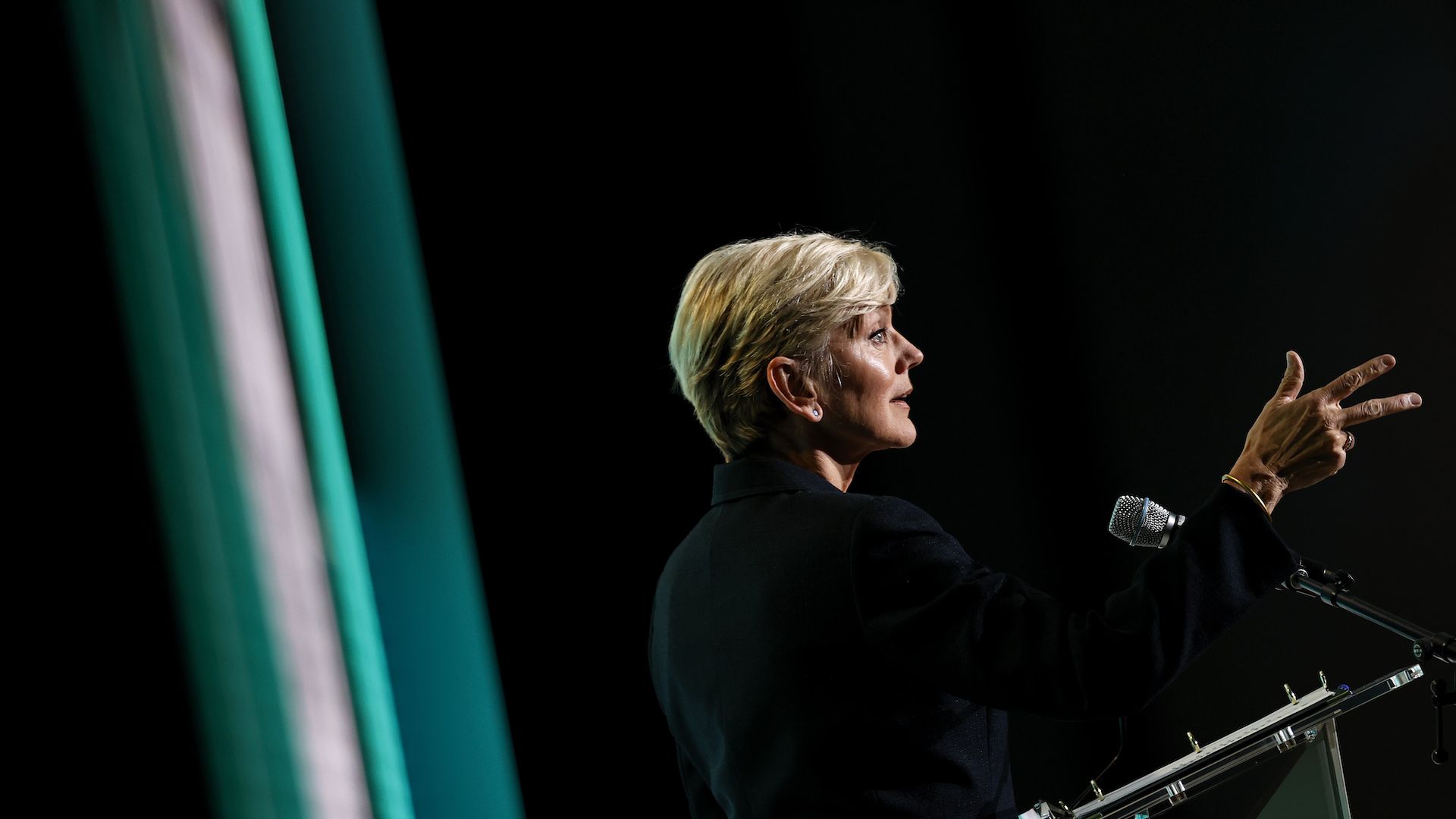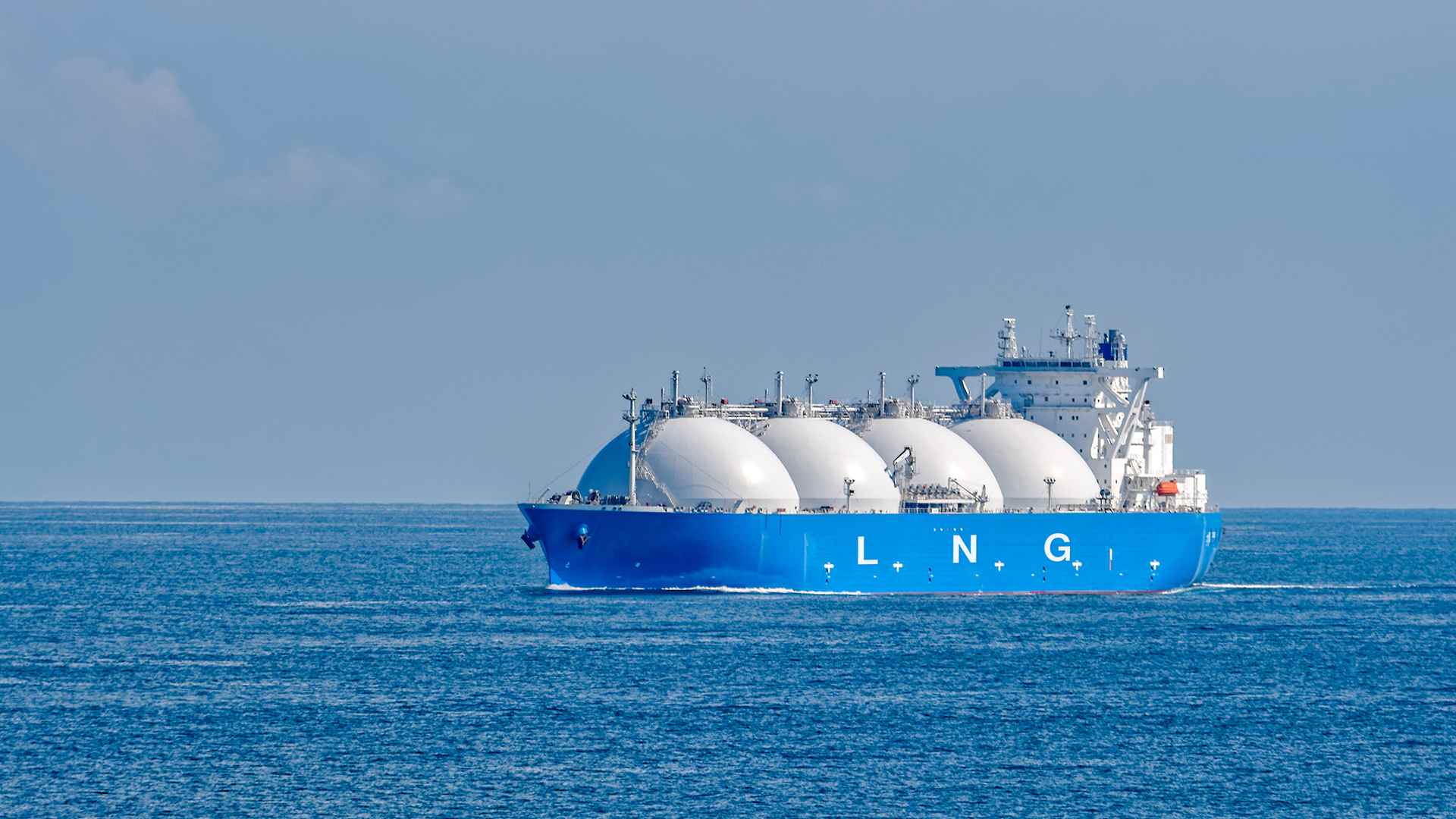| | | | | | | Presented By Enbridge | | | | Axios Generate | | By Ben Geman and Andrew Freedman · Mar 09, 2023 | | 🧁 Good morning from Houston, where we're covering a huge energy conference. Today's Smart Brevity count is 1,253 words, 5 minutes. 💥 Axios is hosting our What's Next Summit on March 29 in Washington, D.C. spotlighting trends and people breaking boundaries and shaping our world. Check out the lineup and register for the livestream. 🎶 We're shouting out Texas artists all week, so Khruangbin and Leon Bridges have today's brilliant intro tune... | | | | | | 1 big thing: Energy transition to disaster |  | | | Illustration: Aïda Amer/Axios | | | | HOUSTON — The energy transition is the common thread running through nearly every panel discussion and presentation at the big CERAWeek by S&P Global confab this week — but executives don't agree on what it means, Andrew writes. - To oil and gas CEOs, the energy transition means investing in cleaner technologies, but also producing more fossil fuels for decades to come.
- To the Biden administration, it means making those fossil fuels as clean as possible, while pushing for more renewables as fast as possible.
Why it matters: The climate science findings are not subtle about what the energy transition means: a rapid, sustained shift away from fossil fuels. The big picture: A 2021 International Energy Agency report found that in order to meet the Paris Agreement's 1.5°C goal, no new oil and gas fields can be developed. - An analysis published late last year found the world only has nine years left at 2022 emissions levels before the 1.5°C (2.7°F) temperature target is reached.
- Scientists warn that exceeding this threshold boosts the odds of potentially disastrous consequences, such as setting off the runaway melting of a large portion of the West Antarctic Ice Sheet and the loss of warm water coral reefs.
Driving the news: In one panel after another, oil and gas CEOs have extolled the virtues of pursuing an energy transition in which high carbon fuels are substituted for lower-carbon sources. Yes, but: When the math of each company's plans are added up, they would set the world on course to blow through the remaining "carbon budget," which measures how much more we can emit before reaching or exceeding the Paris Agreement's global average surface temperature targets — 1.5°C and 2°C. Zoom in: Oil and gas CEOs say they need to boost investments in fossil fuels to meet growing demand in developing markets and provide energy security to the industrialized world. - For example, Chevron CEO Mike Wirth touted his company's goals of expanding production in the Permian Basin and Kazakhstan.
- Nawaf Al-Sabah, the CEO of Kuwait Petroleum Corp., said his company plans to raise output by 1 million barrels of oil equivalent per day by 2035, citing the relatively low carbon intensity of its oil supplies.
- Many companies see deploying tech that strips emissions from fossil fuels as key to staying in their core business longer, rather than rapidly diversifying away from oil and gas.
The other side: To the Biden administration, represented here by Energy Secretary Jennifer Granholm and other senior officials, the energy transition means abating the carbon from fossil fuel sources that will be a piece of the energy puzzle for many years to come, while dramatically expanding renewable technologies and deployment. - She pitched oil and gas companies on using their resources, from brainpower to machinery, to make advances in producing renewable energy.
The bottom line: Ashvin Dayal, a development and climate expert for the Rockefeller Foundation, told Axios that some energy companies are pitching continued fossil fuel production, particularly of natural gas, so that developing nations can grow their energy use. - But "the real prize," Dayal said, would be to help developing countries leapfrog toward renewables.
Read the whole story |     | | | | | | Bonus: The carbon budget's harsh math |  Reproduced from Global Carbon Budget 2022; Note: Historical data used for 2000-2022. Temperature targets refer to Paris Agreement targets for the global mean temperature increase by 2100; Chart: Axios Visuals The climate change math is not kind to those who wish to continue relying mainly on unabated or partially abated fossil fuels for decades to come, Andrew writes. Zoom in: For the Paris Agreement's 1.5°C target, we have less than a decade left at current emissions rates. - For at least 50% odds of meeting Paris' 2°C target, which carries greater risk of climate change calamities, we only have 30 years left at 2022 emissions rates, the same analysis found.
|     | | | | | | 2. Biden's team to oil execs: Join us, don't fight us |  | | | Energy Secretary Jennifer Granholm speaks during the 2023 CERAWeek by S&P Global conference in Houston on March 8. Photo: Aaron M. Sprecher/Bloomberg via Getty Images | | | | HOUSTON — Energy Secretary Jennifer Granholm has a message for oil execs and EU governments wary of U.S. policy (albeit for different reasons): Low-carbon transition isn't the Hunger Games, Ben writes. Driving the news: Granholm, speaking at the CERAWeek conference Wednesday, pushed companies to invest more in climate-friendly sources that are cousins of their core business. - "You have the skillsets and knowledge to build some critical technologies at scale," she told the conference, while lauding companies already moving that way.
- Granholm cited geothermal, offshore wind, and hydrogen transport as ripe for their knowledge, adding climate law incentives provide 10 years of "carrots you can take to the bank."
Catch up fast: Senior White House aide John Podesta delivered a similar message to industry earlier in the week, citing companies' existing diversification but urging more. - He urged them to "grab the baton and to run with it" now that the climate law provides new support.
Of note: Granholm praised the industry for boosting domestic oil production amid the Russia crisis in the speech, which Bloomberg notes was a vibe shift. The intrigue: She put a positive spin on tensions with EU officials over U.S. subsidies for low-carbon tech manufacturing projects. - Granholm pointed out that's pushing Europe to boost support and called "friendly competition" helpful to the world.
Yes, but: There's no way to completely paper over the divides. - For instance, Granholm said: "We don't want to stoke trade wars or anything like that, but we are serious about bringing back supply chains into this country."
- And oil execs argue the White House is stifling development, including what they fear will be a de facto rejection of ConocoPhillips' big Willow project in Alaska.
|     | | | | | | A message from Enbridge | | Advancing the energy transition today | | |  | | | | Enbridge is reducing emissions to reach net-zero by 2050. The company is modernizing its assets, using solar energy to power its systems and ensuring new investments are aligned to emissions targets. To build a cleaner energy future tomorrow, today. | | | | | | 3. Catch up fast on policy: DOE and offshore drilling |  | | | Illustration: Sarah Grillo/Axios | | | | The Energy Department is inviting applications to deploy $6 billion for first-of-their-kind or early stage commercial projects that help decarbonize industries like cement and steel, Ben writes. - Why it matters: Heavy manufacturing is a huge emissions source that's tricky to clean up due to very high-temperature processes and lots of power needs.
- The big picture: The solicitation calls it a "critical opportunity to solidify a 'first-mover' advantage for U.S. industry, bolstering its competitiveness globally for decades into the future."
- Zoom in: DOE is offering 50% cost-share for projects, with "concept papers" due April 21 and full applications by early August.
🛢️"The Biden administration needs until the end of this year to finalize a long-awaited five-year plan for offshore oil and gas development in federal waters, according to court documents filed this week." (Reuters) |     | | | | | | 4. The GOP's "existential" attack plan on ESG |  | | | Illustration: Maura Losch/Axios | | | | A conservative group leading the charge against "woke capitalism" is giving congressional leaders a detailed roadmap for dismantling the ESG movement, Axios' Hans Nichols reports. Why it matters: A new report from Consumers' Research provides a lengthy list of specific questions for House Republicans at public hearings to establish fact patterns for litigation and to seek to show asset managers are forsaking fiduciary duty in the name of political goals. Yes, but: Asset managers like BlackRock and State Street Global Advisors say they're are responding to investor demand and highlight that many ESG offerings, like funds that focus on energy transition, have performed well. Read the whole story |     | | | | | | 5. Tropical Cyclone Freddy's historic, deadly journey |  | | | Satellite view of Tropical Cyclone Freddy on Thursday morning. Image: CIRA/RAMMB | | | | Tropical Cyclone Freddy is likely to be Earth's longest-lasting tropical cyclone on record, having formed on Feb. 6, Andrew writes. - The storm traversed the entire width of the southern Indian Ocean in a rare straight east-to-west line, before making landfall in Madagascar and Mozambique.
Driving the news: Freddy will hit Mozambique for a rare second time on Thursday and Friday, with heavy rains spreading into Malawi as well. The storm first hit Madagascar as a Category 3 storm on Feb. 21 and came ashore in Mozambique on Feb. 24. Zoom in: The World Meteorological Organization, a U.N. agency, has set up a committee to investigate whether Freddy has beaten Hurricane John, which lasted 31 days in 1994. - The storm is already blamed for at least 21 deaths.
|     | | | | | | A message from Enbridge | | The time is right for North American LNG | | |  | | | | Amid surging global demand for energy, liquefied natural gas has become a compelling solution to the dual challenge of energy security and curbing emissions. Enbridge transports 20% of natural gas consumed in the U.S. and is working to connect this resource to global markets. | | | | 📬 Did a friend send you this newsletter? Welcome, please sign up. 🙏 Thanks to Nick Aspinwall and David Nather for edits to today's edition. |  | | Dive deeper into the future of energy | | | | | | Axios thanks our partners for supporting our newsletters.
Sponsorship has no influence on editorial content. Axios, 3100 Clarendon Blvd, Arlington VA 22201 | | | You received this email because you signed up for newsletters from Axios.
To stop receiving this newsletter, unsubscribe or manage your email preferences. | | | Was this email forwarded to you?
Sign up now to get Axios in your inbox. | | | | Follow Axios on social media:    | | | | | |











No comments:
Post a Comment